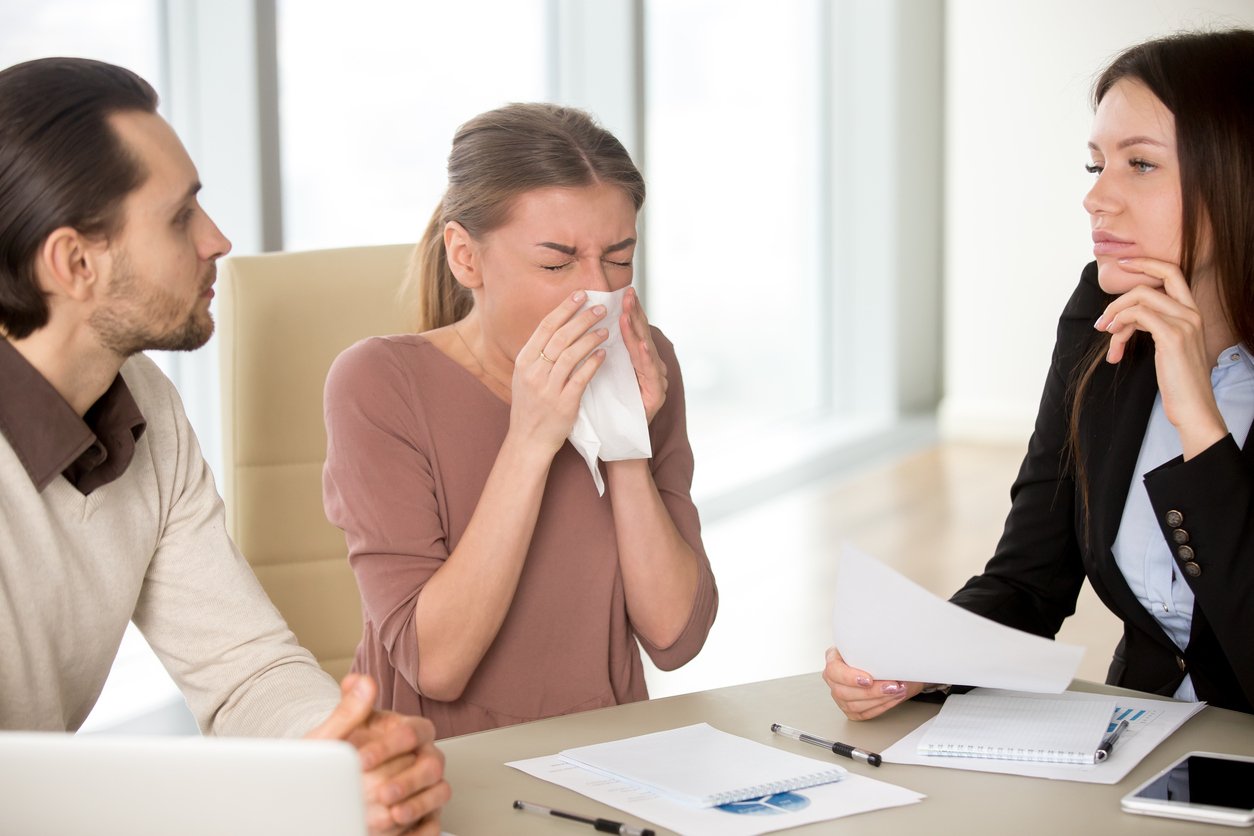Helpful Tips for Minimizing Exposure to the Coronavirus at the Office

Talk of coronavirus, or COVID-19, prevention and how to avoid a virus are the hot topics around every water cooler in the United States right now. No matter what type of workplace you're in, you and your coworkers can probably talk of little else. Health and prevention are at the forefront of everyone’s minds, so Injured Workers Pharmacy wants to help put yours at ease. At IWP, patient safety is our number one priority, but we want employees to stay healthy, too.
In addition to sharing safety methods that you can use at the office to minimize the risk of exposure, we’re going to talk about several measures that your management may put into place to deal with the pandemic. Staying healthy is essential, along with keeping others safe.
Preventative Measures to Maintain a Healthy Office Environment
Every employee can do their part to make the office a healthier place, not just now but every day. It doesn’t take much. Following these protocols can minimize the spread of infection. They’re also useful practices for day-to-day life.
Clean the Office Regularly and Thoroughly
Frequent cleaning of all high-traffic areas in the office is one of the most efficient measures you can take to prevent the spread of coronavirus throughout your workspace. In addition to utilizing your cleaning services with higher frequency, everyone at the office can chip in to do their part.
Thus far, the CDC doesn’t require any special disinfectant or other cleaning measures. Simply wiping down often-used surfaces, such as desks, telephones, and keyboards, ought to do the trick. Encourage your coworkers to wipe the counters and tables in the break room, as well, along with doorknobs and similar items.
Once or twice daily, the cleaning crew can go through the building to clean the conference rooms, cubicles, and other work areas. You may even want to arrange for them to come in on the weekend to give the office a deep cleaning. This can be helpful since the coronavirus is believed to linger on surfaces for three to five days.
DIY Disinfecting
We touched upon the idea of inviting everyone to wipe down their own workstations, as well as other commonly used areas. Management can also take the opportunity to give you the supplies and tools necessary to maintain a healthy office space.
Talk to management and your coworkers about placing containers of disposable disinfectant wipes around the office. Making them handy in every department allows employees to wipe down those frequently touched surfaces. Most employees are happy to lend a hand, especially since it helps to minimize their risk of exposure to the virus, not to mention everyone else’s.
A liberal supply of hand sanitizer is effective, as well. Placing hand sanitizers in the bathrooms, break rooms, and conference rooms encourages everyone to use them. Clean hands are crucial for killing the coronavirus.
Teach Proper Health Etiquette Around the Office

With a few simple preventative health measures, every person in the office can do their part to not only stay healthy but also avoid the spread of germs. Using hand sanitizer throughout the day is helpful. Regular hand washings are even better. In addition to washing your hands after eating or visiting the restroom, you should wash up after coughing or sneezing, as well.
Try not to cough or sneeze into your hands, though. It’s proper etiquette to engage in the vampire cough, which involves covering your mouth and nose with your upper arm and coughing or sneezing into the crook of your elbow. Another safe method is to cough and sneeze into a tissue. You then throw away the tissue and wash your hands.
What to Do When a Coworker Gets Sick
Despite everyone’s best efforts, someone in the office may start to exhibit symptoms of an illness. At first, they can seem like nothing more than seasonal allergies or the common cold. Most strains of flu begin with a few sniffles or a fever, however.
That’s certainly true of the coronavirus, which initially presents with an innocuous symptom: a dry cough. It progresses to shortness of breath and often results in a fever, as well. There’s still time to minimize exposure risks after someone begins to get sick.
Check Yourself

Every employee should check themselves daily for symptoms. All you have to do is take stock of how you feel. Are you experiencing trouble breathing? Does your chest feel tight? Do you have a cough that you can’t quite shake?
Talk to your managers and other bosses in this situation. PTO and sick time aren’t your only options, but you may elect to take a few days to see if your symptoms develop into anything more serious. Beyond that, it’s wise to encourage anyone to stay home when they have a fever because it generally means that a person is contagious.
Company-Wide Policies
Ideally, your company has protocols in place to handle a pandemic situation like the one surrounding COVID-19. For example, many businesses are implementing sick policies that are broader and more flexible. Along with encouraging employees to stay home if they have respiratory issues or a fever over 100 degrees, they don’t require notes from a doctor or health care provider from employees who have the virus or at-risk employees, e.g., the immunosuppressed.
To minimize risk exposure, your employer might ask you to head home if you come in with a persistent cough, a runny nose, or a borderline fever. Talk to your supervisor about the possibility of working remotely. In fact, that’s a worthwhile idea for managers and seniors to consider with regards to any employee who can work from home.
Otherwise, make sure you ask specific questions about policies during this time. Once again, a number of companies are creating sick leave policies to deal with COVID-19 directly. They’re also creating new strategies for paid time off in the case of employees who have to quarantine for two weeks or more
Workers’ Compensation Policies Related to the Coronavirus
Several states are implementing workers’ compensation coverage or unemployment compensation benefits for employees who have become exposed to coronavirus via their time at work:
- People in Pennsylvania may be able to receive benefits if they’re out of work because of the virus
- In Washington state, workers who are exposed to the Ccronavirus because of their jobs may be covered under workers' compensation
- Oregon is taking a case-by-case approach to determining whether individual claims are eligible for benefits
- Kentucky recently decided to expand wage replacement to any first responders or health care professionals who go into quarantine because they were exposed to the coronavirus on the job
Because several other states have similar approaches, you may want to look into the official workers’ compensation policies in your home state.
For injured workers already receiving benefits through workers' compensation, you may be concerned about your risk of exposure, especially if you are dealing with illness or comorbidities. Instead of leaving your home to visit a local pharmacy, IWP can deliver your workers' compensation medication directly to your home - without ever needing to leave. Staying home and stopping the spread is an important part of getting past this pandemic.
You know how to prevent the spread of the flu, Coronavirus, or any other illness now. Make sure to take stock of yourself at the beginning of each day. Don’t minimize cold and flu symptoms. With your help and the assistance of your coworkers, you can have a happy, healthy office. IWP wishes you the very best and urges you to take care of yourself and each other.
To learn more about protecting yourself and others, click the button below to view our webinar:
Other Posts You Might Be Interested In
Protecting Health Care Heroes and First Responders from COVID-19
Read MoreWill My Job Cover My COVID Workers’ Compensation Claim?
Read MoreTelemedicine in Workers’ Compensation Gaining Traction
Read MoreSubscribe to email updates
Stay up-to-date on what's happening at this blog and get additional content about the benefits of subscribing.


